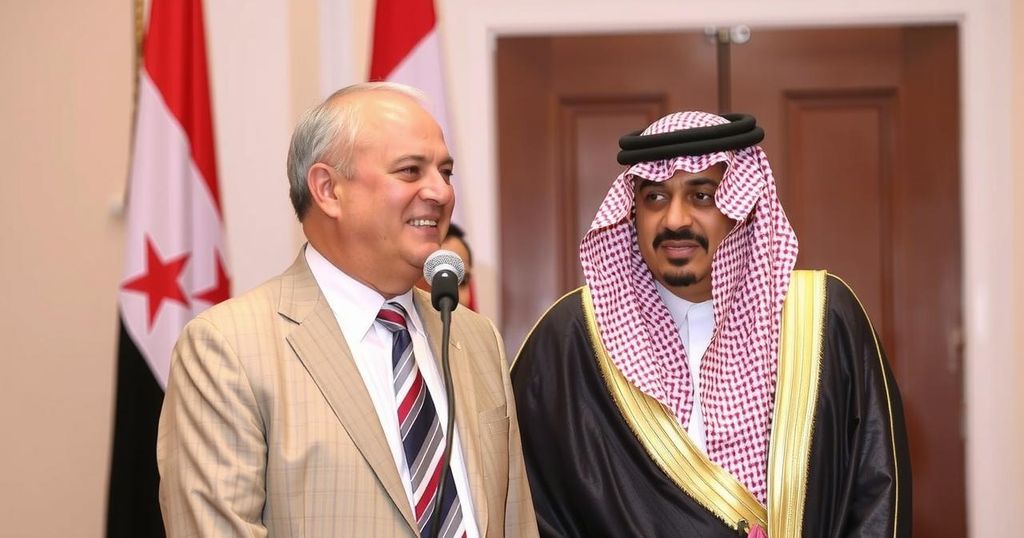Syria’s new Foreign Minister Asaad al-Shibani visited Qatar to engage in discussions aimed at restoring diplomatic relations. This visit is part of a broader initiative to build partnerships crucial for the country’s security and economic recovery, especially in the wake of the devastating civil war. Efforts to alleviate economic sanctions and foster a political roadmap through national dialogue were also highlighted during the trip, while uncertainties regarding international support remain.
In a significant diplomatic maneuver, Syria’s newly appointed Foreign Minister Asaad al-Shibani has made a visit to Qatar to meet with Prime Minister and Foreign Minister Mohammed bin Abdulrahman Al Thani. This meeting is part of broader efforts by the de facto authorities, specifically those under Hayat Tahrir al-Sham (HTS), to re-establish diplomatic relations with regional and international governments. Al-Shibani has indicated plans for upcoming visits to Jordan and the United Arab Emirates, emphasizing the importance of developing strategic partnerships to enhance Syria’s security and economic recovery.
Al-Shibani previously engaged with Saudi Arabia’s foreign minister and welcomed the foreign ministers of France and Germany in Damascus, signaling Syria’s intention to regain diplomatic recognition following years of isolation due to the violent suppression of protests by President Bashar al-Assad’s regime. HTS led a successful insurgency ousting al-Assad, which ended a long-standing rule but left the country in dire economic straits, with around 90% of Syrians living in poverty.
Despite previous opposition, HTS aims to strengthen relations with Arab states, notably Qatar, which historically supported rebel factions against al-Assad. The recent dialogues have brought to light concerns regarding the economic sanctions imposed on Syria, with Al-Shibani stating, “We conveyed to Doha our concerns about the challenges related to the economic sanctions imposed on the Syrian people and we renew our call on the United States to lift those sanctions.”
Plans are in place to hold a national dialogue summit to craft a new political roadmap that could lead to a new constitution and elections, further indicating the efforts toward political reformation under HTS leadership. However, uncertainties remain regarding the potential lifting of sanctions by Washington and hesitance from European nations concerning human rights issues.
Syria has faced immense challenges since the onset of civil conflict in 2011, resulting in considerable humanitarian crises and international isolation for President Bashar al-Assad’s government. HTS, emerging from opposition forces, has attempted to rewrite the regional diplomatic narrative by seeking ties with both Arab and global leaders. The socio-economic situation remains critical, with most of the population living in poverty and struggling with food insecurity, compelling the need to revisit international relations, sanctions, and aid. The backdrop of these diplomatic efforts involves complex geopolitical dynamics and the historical context of the Syrian uprising and subsequent political developments.
The recent visit of Syria’s Foreign Minister Asaad al-Shibani to Qatar marks a pivotal step in the country’s efforts to reestablish diplomatic relationships following years of isolation. While discussions include addressing economic sanctions and enhancing Syria’s economic recovery, skepticism remains regarding the feasibility of lifting such sanctions, particularly from Western governments. The unfolding political landscape will largely determine Syria’s future, particularly in light of proposed national dialogue aimed at political reform and reconciliation among diverse factions.
Original Source: www.euronews.com






